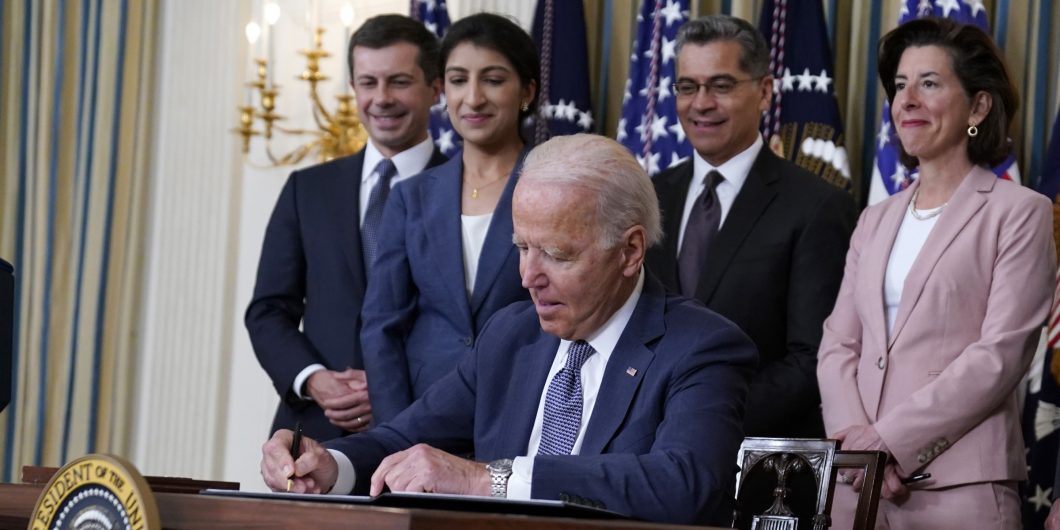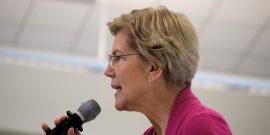The marketplace likely will move much faster than the court system, particularly in as dynamic an industry as technology.
Abandoning the Consumer Welfare Standard
The Biden Administration wants to transform antitrust law. In doing so, it would dispense with a four-decade-old consensus that the welfare of consumers should be the object of competition policy. This principle would be replaced with a mixture of untested economic ideas combined with a view that antitrust law should somehow advance democracy. If the latter standard seems unclear, its very lack of clarity may be an implicit goal. One of the achievements of the consumer welfare standard is to provide a relatively objective methodology that constrains judges and prosecutors in wielding the awesome power of government against the liberty of private entrepreneurs. Not only will this vision harm economic efficiency, it will also make it easier for government officials to reward friendly companies and punish those who do not do the administration’s bidding even on matters unrelated to competition.
Fortunately, the administration faces substantial obstacles in transforming antitrust law. The consumer welfare standard is now entrenched in judicial decisions. Both Democratic and Republican justices have been applying it for years, even if they occasionally debate the nuances of its application. The administration thus has put its faith in using the regulatory levers of power to change the law, but here too it is likely to meet judicial resistance. Moreover, anything it does by regulation can and will likely be undone by the next Republican administration. Should Biden succeed, competition law would become yet another part of government-by-whiplash and in an area central to our prosperity.
It is true that there are difficult and novel issues in applying antitrust law to some new information technologies, like Google and Facebook, even under a consumer welfare standard. For instance, these tech firms may provide great free services, but they also have a stranglehold over consumer data. But the Biden administration’s blunderbuss approach to antitrust law is not limited to tech, but represents a potentially new mechanism of government control over the commanding heights of the economy.
The Executive Order
President Biden’s “Executive Order on Promoting Competition in the American Economy” shows how his administration wants to change antitrust law. One should not be misled by the frequent reference to “promoting competition” in the order. First, there are other values touted in the order that are in tension with promoting competition. Second, competition is a slippery term. Economists understand it as a process that leads to efficient outcomes and equilibriums. Biden’s order frequently seems to equate competition with low prices and reflects a view that the more companies are in a market, the more “competitive” it is. Third, the order reflects an ideology holding that the market itself tends toward inefficiency and needs to be corrected by government. But all too frequently, it is government regulations that harm competition by helping incumbents.
The order at times is clear that it wants protection for some favored groups from competition. It states, for instance, that “consolidation in the agricultural industry is making it too hard for small family farms to survive.” The reason that small family farms often have trouble competing is that the bigger ones are overall more efficient. There is little danger of monopoly in farms. There remain scores of enterprises in harvesting and otherwise producing food. The economy should welcome efficient consolidation. The concern expressed in the order reflects a previously rejected view offered by the Supreme Court a hundred years ago that antitrust policy should prevent “the driving out of business of the small dealers and worthy men . . . who might be unable to readjust themselves to their altered surrounding.” Biden here not only fails to promote competition. He expressly restrains it.
At another point, the order calls on antitrust to “provide an environment conducive to the preservation of our democratic and political institutions”—another view once popular but correctly rejected for decades. It is not plausible for regulators to determine the legal rules by which companies will advance democracy. This kind of open-ended and nebulous standard invites discretionary actions by the government. Businesses cannot plan unless the law on competition possesses at least a modicum of clarity. And with less ability to plan, there will be less efficiency.
When it comes to items such as pharmaceuticals, Biden is all in favor of low prices. But low prices are not the same as the efficient equilibrium which sound competition sustains. In pharmaceuticals, even more than with other products, the market also delivers innovation from which society greatly benefits. Artificially depressing the prices for drugs may result in less innovation. Indeed, it may result in more suffering and death. To be sure, figuring out the right policies for efficient innovation in pharmaceuticals is not easy, requiring the careful calibration of patent policy. But it is revealing that, as he does elsewhere in the order, Biden focuses simply on getting prices lower rather than taking a long-term social welfare approach. Like the celebration of the family farm, this is a recipe for populism, not an increase in our welfare.
The order simply states that consolidation in industries has led to high prices. But consolidation can lead to efficiencies as well, and it can bring not only lower prices but higher quality. Currently, antitrust law has various careful screens that measure market power and assess business practices to determine whether these practices are more likely to lead to better outcomes for consumers in terms of both prices and quality. These have been reflected in the guidelines regulating mergers—guidelines renewed by both Republican and Democratic administrations—that have become crucial to predictable decision-making by prosecutors and courts.
Even if the Biden administration is unlikely to succeed in the near term in transforming antitrust, it has put on the table a new vision, however amorphous, that may well influence the approach of Democratic administrations and legislators for years to come.
One sensible idea in the order encourages agencies to consider the effect of cartels and consolidation on the ability of workers to compete. It is true that some sectors of industry have on occasion conspired to hold down wages. While such practices are illegal under the traditional principles of antitrust, it is perfectly reasonable to put agencies on notice that they should be on the lookout for this disturbance of market equilibrium. In the long run, the economy and consumers benefit greatly from an unconstrained market in human capital.
But what the order does not require is as striking as to what it does. One of the greatest threats to competition is regulation by government. Unnecessary regulation of products harms competition because big companies can diffuse the costs of regulation over many more units than can small companies. Regulation of capital markets makes it harder for startups to enter and displace incumbents. Tariffs impede foreign competition. When the whole world is the effective market, companies in any particular nation necessarily have a smaller share.
Yet the Biden Executive order does not call for any general reconsideration of government policy in any of these areas other than one sentence suggesting that OMB should consider the effect of regulations on entry barriers, (something it should already do in its traditional cost-benefit analysis). The order is generally premised on the false belief that the main barriers to competition are those created by the market, not by government.
To be sure, there is a welcome call for dismantling unnecessary occupational licensing, permitting hearing aids to be sold without a prescription, and preventing the (mostly) state regulations that put up the price of alcohol. But these provisions only show that the President is likely to stumble on correct economic policies when they are immediately popular. A regulatory regime restricted to addressing externalities, opening capital markets, and promoting free trade would be best for competition and prosperity in the long run, but these will not be central elements of Biden’s policy.
The Prospects
The Executive Order, however ill-conceived the specifics are, will do the most damage if it changes antitrust law fundamentally. And here the Biden administration happily faces problems. We have had forty years of bipartisan competition policy focused generally on consumer welfare. The President does not have a political eraser to wipe that away.
One possibility is for the Biden administration to persuade Congress to enact major changes in antitrust law. The House Judiciary Committee has passed a few bills that would make is harder for tech companies to merge with other companies. But these measures are not yet going anywhere on the House floor, and it will be difficult, if not impossible, to get any substantial changes in antitrust law through the evenly divided Senate.
Thus, the administration has pinned its strategy on transformation through administrative fiat. To that end, it appointed Lina Khan, a 32-year-old associate law professor to become Chairman of the FTC. Khan may be the single most radical appointment in the Biden administration. She opposed Amazon’s acquisition of Whole Foods, although Amazon and Whole Foods together constitute a very small part of the grocery market, and no other company in the history of the United States has been more innovative than Amazon.
Khan has begun by voting along with her Democratic colleagues on the commission to revoke a policy of the FTC supported by both Democratic and Republican administrations that essentially defined “unfair method of competition” by reference to methods that undermined consumer welfare. The idea no doubt is to write a regulation that would provide a more open-ended approach, perhaps taking into account other values like democracy and decentralization, even if these are at the expense of consumer welfare.
But it is not at all clear Khan can succeed. On such a central question as the definition of competition, courts may not give her agency much deference now that the Roberts Court appears to have stopped applying Chevron—the quintessential modern case for agency deference—to major questions raised by a statute. The meaning of competition is obviously the major question for competition law, and courts are likely to determine that for themselves, influenced by decades of their own consumer welfare jurisprudence.
Beyond that technical obstacle, Khan may be a poor choice for overhauling antitrust law because of her lack of practical experience in litigation or administration. She has already alienated her agency staff by refusing to let them speak at professional panels, as they have for years. That is a rookie mistake. Moreover, she has been so strident in her attacks as an activist against companies like Google and Amazon that the courts are likely to look at her enforcement actions with suspicion, even if the companies do not get her recused for her past opinions.
Even if the Biden administration is unlikely to succeed in the near term in transforming antitrust, it has put on the table a new vision, however amorphous, that may well influence the approach of Democratic administrations and legislators for years to come. We are moving from an era of bipartisan consensus around a constrained and economically focused antitrust law to an era of fundamental partisan disagreement. In that sense, antitrust law will become—like many other areas of our law—a reflection of polarization and a source of instability. But here the folly and instability will make us poorer.



